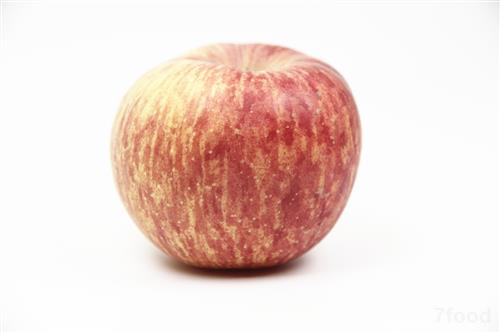Jingning apple is produced in Jingning County, Gansu Province. Jingning County has high altitude, abundant sunshine, large temperature difference between day and night, and no pollution to the environment. It is suitable for growing apples. The Jingning apple is famous for its bright color, large shape, smooth fruit surface, fine juice, moderate acidity, sweet and brittle taste, strong hardness, long shelf life, extreme resistance to storage and long-distance transportation. According to the Ministry of Agriculture Fruit and Seedling Quality Supervision, Inspection and Testing Center, the six physical and chemical indicators of fruit firmness, soluble solids, total sugar, titratable acidity, sugar-acid ratio, and vitamin C have met or exceeded the domestic high-quality apple standards, especially the content of ascorbic acid. Up to 9.32mg/100g. In 2006, the General Administration of Quality Supervision, Inspection and Quarantine (AQSIQ) approved the protection of geographical indication products for Jingning Apple. Jingning County is located in the eastern part of Gansu Province and is located in the hilly and gully region of the Loess Plateau. The soil is dominated by loessial soil, accounting for 91.18% of the county's soil area. The content of organic matter in soil was 0.92%, total nitrogen content was 0.072%, available phosphorus was 8.24PPM, and available potassium was 170.1PPM. It is a semi-humid and semi-arid temperate climate with four distinct seasons, mild climate, abundant sunshine, an average annual temperature of 7.1°C, a frost-free period of 159 days, and an average annual sunshine duration of 2238 hours. Precipitation is more in summer and less in winter and spring. The average annual rainfall is 450.8 millimeters and the annual evaporation is 1469 millimeters. The unique geographical, temperature and soil characteristics are very beneficial to apple production. Jingning was awarded the “Best Planting Area for Eucalyptus Apples on the Loess Plateau†by the Ministry of Agriculture. Jingning County is the largest county for apple cultivation in Gansu, China's famous high-quality apple base and important apple export base. By the end of 2010, the area of ​​orchards in Jingning County reached 760,000 mu, accounting for 50.7% of the total area of ​​cultivated land, and averaged 8.2 mu per capita, per capita 1.65 mu, in 2009 the fruiting area was 300,000 mu, the total output was 300,000 tons, and the per capita fruit income was 1,320 yuan, accounting for more than 50% of the per capita net income. 7 green fruit standardized production professional villages and 60 professional villages were established. In the county, there are 27 large-scale storage-oriented marketing, packaging and processing value-added leading enterprises, with an annual storage capacity of 150,000 tons, a processing and conversion capacity of 70,000 tons, and storage, trafficking and fruit juice, fruit wine and fruit The vinegar processing industry has a wide range of extension industries. According to the "Regulations on the Protection of Geographical Indication Products," AQSIQ has organized a review of applications for the protection of Jingning Apple's geographical indication products. After passing the review, it approved the implementation of protection of geographical indication products for Jingning Apple from September 4, 2006. First, the scope of protection The scope of protection of the geographical indication products of Jingning apple is based on the scope of the report “Defining the scope of the production area of ​​the Jingning apple†by the People's Government of Jingning County of Gansu Province (Jingzhengzi [2006] No. 16), which is Renda Town of Jingning County, Gansu Province. Lidian Town, Zhiping Township, Shengou Township, Jiahe Township, Yuwan Township, Leida Township, Shuangjiao Township, Gangou Township, Xindian Town, Gucheng Township, Chengguan Town, Chengchuan Township, Weiyu Town, Siqiao Town Townships, Sihe Township, Hongsi Township, Xixiang Township, Jieshipu, Bali Town and other 20 townships now have administrative jurisdiction. Second, the quality requirements (a) Variety. Red Fuji, Qin Guan. (b) site conditions. At an altitude of 1,300 to 1,700 meters; the soil is loessial soil, with an organic matter content of ≥ 0.9% and a pH value of 7.5 to 8.0. (3) Seedling breeding. With the new wild apples, medlars, and Donghai estuaries as rootstocks, the scion grafting and breeding of red Fuji line and Qin crown cultivars were selected. (d) cultivation and management. 1. Planting: No more than 660 planting densities per hectare. Autumn plants are planted before the soil is frozen, and then watered and buried for winter. After the soil is thawed in the spring, the seedlings are planted before germination, and water is irrigated after planting. 2. Soil management: implement soil management techniques such as sand-dressing, grass-mulching, and mulching and so on. 3. Fertilization: Organic fertilizer should not be less than 60 tons per hectare, and chemical fertilizer application should not exceed 1.5 tons per hectare. Basal fertilization is applied in autumn or early spring, and the depth is from 30cm to 40cm. All organic fertilizers and 2/3 chemical fertilizers are applied. The topdressing is applied before flowering, and the young fruit is applied in a shallow ditch. The depth is 15cm to 20cm. The application amount accounts for 1/3 of the annual chemical fertilizer usage. 4. Water Management: According to soil moisture, timely irrigation before flowering, young fruit expansion and winter. 5. Pruning: The shape of the tree is a spindle or an improved spindle. The winter pruning is combined with the summer pruning. The pruning seasons are controlled at 900,000 to 1.2 million pieces per hectare. 6. Flower and fruit management: artificial thinning and fruit thinning, leaving a fruit every 20 centimeters, and the yield per hectare is controlled within 45 tons. (v) Harvesting and storage. 1. Harvest: Harvest time from October 10 to 20, growth period 170 days. 2. Storage: The natural ventilation warehouse is stored until the end of March of the following year; the storage period of the atmosphere storage warehouse is the end of June of the following year. IAV/IBV/ADV Nucleic Acid Test Kit IAV/IBV/ADV Nucleic Acid Test Kit Guangdong Hecin Scientific, Inc. , https://www.hecinscientific.com